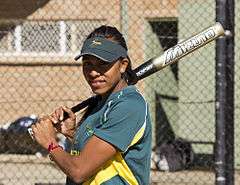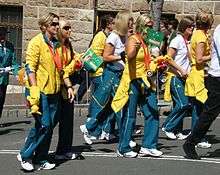Australia women's national softball team
The Australia women's national softball team, also known as the Aussie Spirit,[1] is the national softball team of Australia. It is governed by Softball Australia and takes part in international softball competitions. They are one of Australia's most successful women's sporting teams on the world stage, and they have achieved outstanding results over the last 3 decades. Alongside the USA team, the Aussie Spirit are the only other team to medal at all 4 Olympics that softball was included as a sport in the Olympics program.[1] At the inaugural Women's Softball World Championship held in Melbourne, 1965. Australia claimed the first ever title, winning Gold and stamped themselves as a pioneer in the sport.
| Medal record | ||
|---|---|---|
| Softball at the Summer Olympics | ||
| Representing | ||
| Olympic Games | ||
| 1996 Atlanta | Team | |
| 2000 Sydney | Team | |
| 2004 Athens | Team | |
| 2008 Beijing | Team | |
| ISF Women's World Championship | ||
| 1965 Melbourne | ||
| 1974 Stratford | ||
| 1982 Taipei | ||
| 1998 Fujinomiya | ||
| 2006 Beijing | ||
| 2014 Haarlem | ||
| World Cup of Softball | ||
| 2005 Oklahoma City | ||
| 2009 Oklahoma City | ||
| 2012 Oklahoma City | ||
| 2013 Oklahoma City | ||
Funding
The national team has not secured as much funding as male dominated sports in Australia despite having performed better than some and having won major international competitions.[2] The removal of softball from the Olympic programme resulted in the national team getting less funding.[3]

History
Australian women competed in their first international competition in 1949 when they played a series against New Zealand in St Kilda at the St Kilda Cricket Ground.[4] 10,000 people watched the game live.[4] The first international for Australian women took place in 1951 when the Australians toured New Zealand.[4][5] Australia won both games against the New Zealanders.[5] In 1960, Australia hosted its first international tournament with national teams from Australia, New Zealand and South Africa competing.[4][5] At the tournament, Australia beat South Africa by a score of 2–1.[5] Australia hosted the event again in 1962, where they beat the New Zealanders in the final 2–1.[5] At the ISF Women's World Championship, Australia finished first in 1965 and second in 1998.[6] The 1965 victory was considered very impressive as they beat the Americans, who invented the game in 1887, to win the championship.[7] Between 1949 and 1967, Australia's senior women's side was undefeated in international play.[5]
Women's World Championship
Australia's women have won the World Championships.[2] Australia was one of five nations to compete at the inaugural ISF Women's World Championship held in Melbourne, Victoria in 1965.[8]:375[9] At the time Australia hosted the event, the sport was being played by women across the country on the club and school level.[8]:482–484 At the 1965 Championships, Australia played two games against the United States where they shut them out and allowed them to score no runs.[10] In 1974, Australia was knocked out at the semi-finals stage by the Americans by a score of 6–0.[11] Australia finished second to the United States at the 1998 championship. They lost in a one hit shutout.[12] This was their best finish since the competition's inception.[6] Australia will compete at the 2012 edition.[13]
Olympics
Melanie Roche, four time Olympic medalist in softball[14]
Australia competed at all four Olympic Games where the sport was played. At them, they won three bronze medals and a silver.[14]

1996 Olympic Team
Going into the 1996 Summer Olympics, Australia were considered one of the favourites to possibly win gold.[15] The Australians beat the Americans at the 1996 Olympics.[14] Australia finished with a bronze medal.[16]
2000 Olympic Team
The 2000 Games were played in Sydney. They had to beat the Americans to qualify for the gold medal, but lost 1–0 in a shut out.[17] The Australians beat the Americans during the early part of the competition during pool play.[8]
2004 Olympic Team
Australia won a silver medal at the 2004 Summer Olympics in Athens.[18][19][20]
2008 Olympic Team
Australia earned a bronze medal at the 2008 Summer Games.[21]
Other competitions
Majorie Nelson was a Victorian softball player. She was the first softball player to represent any country at four World Series of Softball. She was the Australian captain in 1974 and 1978 and the World Series.[22]
Australia earned a bronze medal at the 2005 World Cup.[23] In 2009, they earned a silver at the World Cup of Softball.[24][25]
Australia earned a gold medal at the 2005 Canada Cup.[23] They earned a silver in 2008.[19] They earned a bronze in 2011.[26] Australia earned a silver medal at the 2005 Pacific Rim tournament.[23]
Test series
In 1962, Australia played a test series against New Zealand in New Zealand. Australia won two out of three games in the test.[27]
In March 2012, the team played a test series against the Japan women's national softball team in Canberra.[28]
Indigenous representation
Stacey Porter was the team's first aboriginal teammate to represent Australia in softball the Olympics.[29] Other aboriginal members of the national team include Vanessa Stokes.[29]
References
| Wikimedia Commons has media related to Australia women's national softball team. |
- http://www.softball.org.au/national-teams/open-women/
- Stell, Marion K. (1991). Half the Race, A history of Australian women in sport. North Ryde, Australia: Harper Collins. p. 266. ISBN 0207169713.
- "Canberra Times: Diamonds could lose chance to sparkle". Canberra Times. Canberra, Australia: Financial Times Limited - Asia Africa Intelligence Wire. 6 March 2011. Retrieved 12 March 2012.
- Stell, Marion K. (1991). Half the Race, A history of Australian women in sport. North Ryde, Australia: Harper Collins. p. 209. ISBN 0207169713.
- Pollard, Jack (1968). AMPOL book of Australian Sporting Records. Sydney: The Pollard Publishing Co. pp. 273–274. OCLC 71140.
- White, Patrick (2005). Chambers sports factfinder. Edinburgh: Chambers. pp. 542–543. ISBN 0550101616. OCLC 58052551.
- Viney, Nigel; Grant, Neil (1978). An illustrated history of ball games. London: Heinemann. pp. 97–98. ISBN 0434969400. OCLC 5125714.
- Kelly Boyer Sagert; Steven J. Overman (28 February 2012). Icons of Women's Sport. ABC-CLIO. ISBN 978-0-313-38549-0. Retrieved 10 March 2012.
- 马国力 (2004). 体育英语. 清华大学出版社. p. 59. ISBN 978-7-302-08926-1. Retrieved 10 March 2012.
- Cashman, Richard (2001). Australian sport through time. Milsons Point, N.S.W.: Random House Australia. p. 334. ISBN 1740514459. OCLC 223005022.
- Cashman, Richard (2001). Australian sport through time. Milsons Point, N.S.W.: Random House Australia. p. 370. ISBN 1740514459. OCLC 223005022.
- Ernestine G. Miller (29 May 2002). Making her mark: firsts and milestones in women's sports. McGraw-Hill Professional. p. 273. ISBN 978-0-07-139053-8. Retrieved 10 March 2012.
- "Australian Open Women's Squad 2012". Australia: Softball Australia. 24 February 2012. Archived from the original on 19 March 2012. Retrieved 6 March 2012.
- Brigid O'Connell and Rosie Squires (23 August 2009). "Softball cops rough deal as Olympics plumps for inclusion of golf". Herald Sun. Retrieved 11 March 2012.
- Marlene Targ Brill (1 September 2009). America in the 1990s. Twenty-First Century Books. pp. 121–125. ISBN 978-0-8225-7603-7. Retrieved 10 March 2012.
- Cashman, Richard (2001). Australian sport through time. Milsons Point, N.S.W.: Random House Australia. p. 459. ISBN 1740514459. OCLC 223005022.
- Paula Edelson (2002). A to Z of American Women in Sports. Infobase Publishing. pp. 79–80. ISBN 978-1-4381-0789-9. Retrieved 10 March 2012.
- Hand, Guy (24 August 2004). "AAP News: Soft: Silver softballers find US in a league of its own". AAP News. Australia: Financial Times Information Limited — Asia Africa Intelligence Wire. A200408243A-37B6-AIW. Retrieved 11 March 2012.
- "She's got silver, next goal is gold". Blacktown Advocate. Sydney, Australia. 30 July 2008. p. 3. BAG_T-20080730-1-003-036677. Retrieved 11 March 2012.
- "AIS Softball — Stacey Porter". Bruce, Australian Capital Territory: Australian Institute of Sport. Archived from the original on 25 March 2012. Retrieved 8 March 2012.
- AFP (21 August 2008). "Japan stuns US to win softball gold in Beijing Olympics". Herald Sun. Retrieved 11 March 2012.
- Australia's wide world of sports. Pymble, N.S.W.: Angus & Robertson. 1993. p. 232. ISBN 0207174857. OCLC 38340671.
- Purdon, Fiona (2 December 2005). "Kym batty about Maroons". The Courier Mail. Brisbane, Australia. p. 12. Retrieved 12 March 2012.
- Latzke, Jeff (21 July 2009). "Aussie softballers go down swinging". Herald Sun. Retrieved 11 March 2012.
- "BRIEFS". The Sunday Age. Melbourne, Australia. 24 July 2011. p. 18. Retrieved 12 March 2012.
- "Sport Achievement Awards". Bruce, Australia Capital Territory: Australian Institute of Sport. 2011. Archived from the original on 3 March 2012. Retrieved 8 March 2012.
- Cashman, Richard (2001). Australian sport through time. Milsons Point, N.S.W.: Random House Australia. p. 323. ISBN 1740514459. OCLC 223005022.
- Rees, Courtney. "Swapping London games for Canberra". Canberra Times. Canberra, Australia. p. 20.
- Rees, Courtney (24 March 2012). "Chasing indigenous talent". Canberra Times. Canberra, Australia. p. Sports, 14.